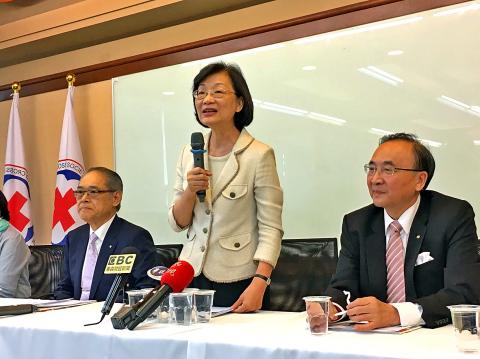The first policy negotiations between the Executive Yuan and the Legislative Yuan on Monday night resulted in a decision to abolish the Red Cross Society Act of the Republic of China (中華民國紅十字會法), the Executive Yuan said.
The New Power Party (NPP) and the Democratic Progressive Party (DPP) in February proposed abolishing the act, saying that the society had special legal status and was not subject to the Civil Associations Act (人民團體法) and the Charity Donations Act (公益勸募條例), adding that the abolishment of the act would advance the implementation of “transitional justice.”
While the NPP on May 3 moved to have the abolishment measure sent directly to a second reading, bypassing all discussion in committees, the Chinese Nationalist Party (KMT) objected, resulting in yesterday’s cross-caucus negotiation.

Photo: Yang Mien-chieh, Taipei Times
However, the negotiations failed to reach a consensus, with the legislature to vote on the annulment of the act in early July at the latest, according to legislative procedures.
In response to protests from the Red Cross Society since the annulment was first proposed, Executive Yuan spokesperson Tung Chen-yuan (童振源) said the society misunderstood the decision.
“The society’s establishment has its historical background and necessity, and we do not doubt it has contributed positively to the nation and to the public, but there also exist certain flaws in how the society functions, including the use of its charity funds and the election of its chairperson,” Tung said.
Negotiations saw the Executive Yuan’s support for the legislature’s motion to abolish the act so the society becomes more transparent and healthy in its organization, thus being of greater benefit to the public, Tung said.
Once the abolishment measure is passed, the central government would no longer have to assign an official to sit on the society’s board, Tung said, adding that the organization would be regulated in accordance with the Civil Associations Act.
As for the groups’s fundraising drives, Tung said that if the abolishment motion is ratified, the society’s fundraising would have to follow regulations according to the Charity Donations Act.
Society chairperson Wang Ching-feng (王清峰) said that the perceived flaws in how the group functions should have been rectified via investigation or legal action rather than by abolishing the act, adding that the decision has impinged on the reputation of a humanitarian organization.
Additional reporting by Yang Mien-chieh

PREPAREDNESS: Given the difficulty of importing ammunition during wartime, the Ministry of National Defense said it would prioritize ‘coproduction’ partnerships A newly formed unit of the Marine Corps tasked with land-based security operations has recently replaced its aging, domestically produced rifles with more advanced, US-made M4A1 rifles, a source said yesterday. The unnamed source familiar with the matter said the First Security Battalion of the Marine Corps’ Air Defense and Base Guard Group has replaced its older T65K2 rifles, which have been in service since the late 1980s, with the newly received M4A1s. The source did not say exactly when the upgrade took place or how many M4A1s were issued to the battalion. The confirmation came after Chinese-language media reported

The Taiwanese passport ranked 33rd in a global listing of passports by convenience this month, rising three places from last month’s ranking, but matching its position in January last year. The Henley Passport Index, an international ranking of passports by the number of designations its holder can travel to without a visa, showed that the Taiwan passport enables holders to travel to 139 countries and territories without a visa. Singapore’s passport was ranked the most powerful with visa-free access to 192 destinations out of 227, according to the index published on Tuesday by UK-based migration investment consultancy firm Henley and Partners. Japan’s and

A Ministry of Foreign Affairs official yesterday said that a delegation that visited China for an APEC meeting did not receive any kind of treatment that downgraded Taiwan’s sovereignty. Department of International Organizations Director-General Jonathan Sun (孫儉元) said that he and a group of ministry officials visited Shenzhen, China, to attend the APEC Informal Senior Officials’ Meeting last month. The trip went “smoothly and safely” for all Taiwanese delegates, as the Chinese side arranged the trip in accordance with long-standing practices, Sun said at the ministry’s weekly briefing. The Taiwanese group did not encounter any political suppression, he said. Sun made the remarks when

BROAD AGREEMENT: The two are nearing a trade deal to reduce Taiwan’s tariff to 15% and a commitment for TSMC to build five more fabs, a ‘New York Times’ report said Taiwan and the US have reached a broad consensus on a trade deal, the Executive Yuan’s Office of Trade Negotiations said yesterday, after a report said that Washington is set to reduce Taiwan’s tariff rate to 15 percent. The New York Times on Monday reported that the two nations are nearing a trade deal to reduce Taiwan’s tariff rate to 15 percent and commit Taiwan Semiconductor Manufacturing Co (TSMC, 台積電) to building at least five more facilities in the US. “The agreement, which has been under negotiation for months, is being legally scrubbed and could be announced this month,” the paper said,